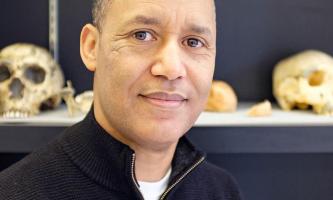

Donald N. Pritzker Professor, Department of Organismal Biology and Anatomy; Chair, Working Group for Sub-Saharan Africa
Zeresenay 'Zeray' Alemseged studies the origin and diversification of early human ancestors and the environmental factors that influenced their evolution. His objective is to unearth and analyze clues to their biology and behavior and to identify milestone evolutionary events that ultimately led to the emergence of modern Homo sapiens. Alemseged is best known for his discovery of the fossilized remains of the world’s oldest child (a 3.3-million-year-old child of the species Australopithecus afarensis nicknamed ‘Selam or Dikika Child’), the discovery of the earliest evidence for stone tools used in the human lineage, and his work to increase our understanding of Africa’s past natural history.
Professor Alemseged co-founded and held the presidential office of the Eastern African Association of Paleoanthropology and Paleontology, a group developed to bring opportunities for academic exchange and networking to local African paleo-scientists, as well as bridge the gap between scientists and local policy makers. He is also a Founding Member and Co-Chair of the African Rift Valley Research Consortium, member of the American Academy of Arts and Sciences, American Association for the Advancement of Science and Pontifical Academy of Science.
Q&A
Q: Why is international collaboration important in your field of study?
A: My field of study deals with the origin of the 8 billion people who are tied not only by their past but also their destiny given our increasing interconnectedness and our many shared challenges including climate change and pandemics. International collaboration is therefore inherently required to understand the origins of all of us.
Q: What has interested or surprised you most in building your international collaborations?
A: From my international collaborations, I have learned that despite the many cultural and linguistic differences all human beings are passionate about their origins (near or distant) - they only pose the question in different ways (traditional, religious, cosmic, etc.). The study of human evolution in an internationally collaborative framework unifies us all by offering a measurable scientific approach.